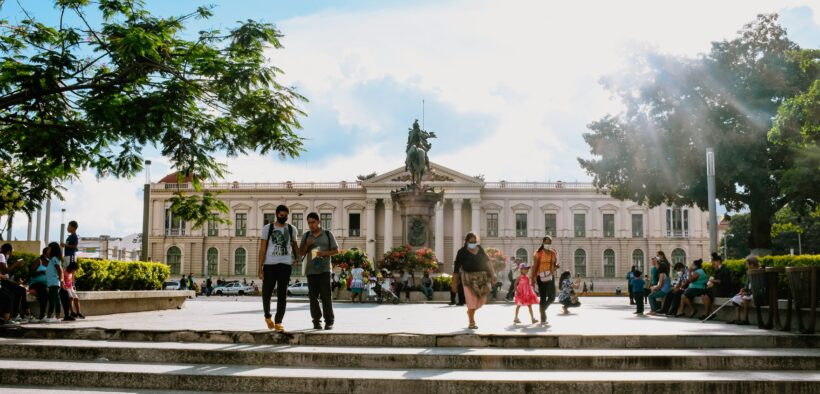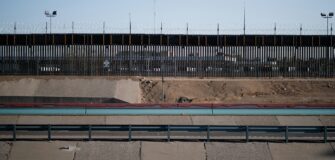Truces to Terror: Bukele’s Legacy of Gangs and Mass Incarceration in El Salvador
Share

Image Credits: @mauriciocuellar on Unsplash (Unsplash License)
In 2012, Nayib Bukele won the mayoral election in Nuevo Cuscatlán, a small municipality in El Salvador, as a part of the Farabundo Martí National Liberation Front (FMLN), which is a left-wing political party. That same year, the FMLN organized a pact with the two biggest gangs in El Salvador: MS-13 and Barrio-18. This truce was formulated secretly, as negotiating with gangs is a highly controversial issue that could result in public backlash. The agreement allowed for the gangs to have around thirty members moved from the Zacatecoluca Security Penitentiary Center to state prisons in exchange for a lower homicide rate. As a result, the murder rate in the coming weeks dropped, with the average of daily murders dropping from fourteen to six. This “truce” was quickly revealed by Salvadorian journalists and exposed to the public. The Minister of Justice and Public Security, David Munguía Payés, denied any agreements with MS-13 and Barrio 18, claiming that the homicide rates dropping were from the work of the National Civil Police. The government chose to continue denying any alleged truces that came up in the media.
Two weeks later, President Mauricio Funes spoke about the controversy at a conference in the Presidential House. Funes specifically denied a negotiation between the government and the gangs, but he stated that he aided in a truce between the gangs. He told the public to trust the government and used the drop in the homicide rate as evidence. In turn, the gangs had also made public statements. On March 19, 2012, the gangs published their first comment on the situation, which consisted of ten points. In those ten points, they explained that they were not asking to be forgiven for previous offenses but to be given opportunities to be reintroduced into society. This included being given work and education opportunities without being discriminated against. Another point that was emphasized was that they wanted to be a part of the solution of curbing homicide and violence rates since they were the main parties engaging in such acts.
Through the rest of 2012, three smaller gangs and two confederations of civil prisoners joined the agreement with the government because of the benefits, including withdrawing the military from the prison, making visitation easier for prisoners, and creating the Special Job Placement Parks for gang members and their families. Gang violence overall began to drop. They ceased mutual attacks and attacks on civilian victims, as well as attacks on police, soldiers, and guards. Other commitments included creating “safe zones” within schools and universities, and ending violence against women and targeted jumpings. The gangs also provided the government with arms as a part of the agreement. In exchange, the government continued to release members from the Zacatecoluca Security Penitentiary Center and increase benefits to prisoners.
The peace in El Salvador was short-lived, as the truce did not truly curb violence. In the following year, the number of unmarked graves significantly increased. For example, in 2013, approximately 44 unmarked bodies were found in the Colon province, and it is speculated that there are more. Additionally, the number of disappearances doubled in 2013 from the previous year. The truce only stopped documented homicide rates, but gangs continued to operate behind the scenes. As the violence continued, it was evident that the truce was deteriorating. The breaking point of the truce was in 2015, when the newly elected president, Salvador Sanchez Ceren, stated that they would no longer negotiate with MS-13, Barrio-18, or any other involved gangs. To legitimize this, he removed all gang members who were previously moved to lower-level security prisons back to the Zacatecoluca Security Penitentiary Center.
Following the end of the truce, El Salvador entered a period of great violence. In March of 2014, El Salvador had the deadliest month the country had seen in over a decade. It is estimated that there were 481 recorded homicides that month alone. The violence was not just between gangs, but it extended to law enforcement and citizens as well. The gangs attacked both public spaces and police buildings with explosive weapons, including grenades. In addition to active duty officers, 20 off-duty military officers were assassinated. Such violence was aided by military training that the gangs invested in. It is reported that current and former members of the Salvadoran military provided the gangs with such training.
The violence was far from over. While the murder rates fluctuated, there was never a time of peace. In December of 2014, there were over 411 homicides, which was an alarming jump from previous months. The violence culminated in 2015, which ended up being El Salvador’s most brutal year. There was an estimated rate of 103 murders per 100,000 residents. While this occurred, Nayib Bukele and his party continued negotiating with gang leaders behind the scenes. In 2014, they exchanged votes in the upcoming election for prison benefits and money. This proved beneficial, as Bukele won the election in 2015 and entered his term as mayor of the capitol.
During his term as mayor, Bukele and the FMLN remained in contact with gang leaders. He was given special access to specific communities and enacted plans within them because of negotiations. In return, his team provided members with employment opportunities, mainly consisting of security jobs. Ultimately, this came to an end when the FMLN removed Bukele from its party due to alleged maltreatment. Following this decision in 2017, Bukele came out on the social media platform X, formerly known as Twitter, and announced that he was now a member of the independent party.
The separation from FMLN did not stop Bukele from pursuing a political role, as he won the presidency in 2019. He continued his secret negotiations with gang leaders until an article was released in 2020, entailing the dealings between Bukele and the gangs. This article included all of the meetings between Bukele’s administration and said gang leaders that took place within Zacatecoluca and Izalco Phase III prisons. When this documentation of the pact was released, the country received public condemnation and sanctions from the United States. The United States Department of the Treasury released a statement claiming that this truce was a transnational threat and that they would continue to work on dismantling links between criminal organizations and corruption, specifically within governmental institutions. There were various public exchanges between Bukele and the United States, in which Bukele denied accusations of financially compensating gang leaders. Following this, El Salvador’s homicide rates spiked once again and left the citizens in a state of constant danger.
In response to the rising gang violence, Bukele issued a state of emergency in March of 2022. The decree stated that constitutional guarantees of freedom of assembly would be suspended and arrest regulations would be eased. Soldiers and other law enforcement officers were allowed to imprison citizens that could be considered suspicious. This included any person who had been anonymously accused, had tattoos that could be gang-affiliated, or had a previous criminal record. While in custody, prisoners did not receive a fair trial and were not given proper access to defense attorneys.
After Bukele issued this state of emergency, he also announced his newest project: The Center for the Confinement of Terrorism (CECOT). This prison was designed to hold said gang members who were being arrested without complete evidence. Bukele told the public that the prison was meant to hold prisoners for decades, where they would not be able to harm society any longer. Bukele released video footage of the insides of the prison and inmates being transferred on his X platform. Prisoners can be seen with shaved heads, shackled ankles and wrists, and having only white shorts to cover themselves. Each cell holds around 65 to 70 prisoners at a given time. With round-the-clock security, there is supposedly no room for possible escape or misbehaving. Additionally, there are no visitation or rehabilitation programs within the facility, and it appears that there is no plan for release.
The CECOT prison is receiving international disapproval. Amnesty International, a human rights group, is condemning the actions of Bukele and his administration. They believe that human rights violations and the alteration to law are not the answer to gang violence. Such violations include a lack of proper medical care, unsanitary conditions, and overcrowding. Amnesty International has documented at least ten individuals who have died while imprisoned. The deaths were due to torture and maltreatment from guards and a restriction on health care. Due to these reasons, Amnesty International is calling for Bukele to remove the state of emergency and for international intervention if removal does not occur.
In addition to human rights violations, the mass incarceration and the CECOT prison are not consistent with the Universal Declaration of Human Rights, which El Salvador has ratified. Although the declaration itself is not necessarily legally binding to the state parties, it embodies principles of human rights standards that are included in other legally binding international instruments. The Declaration was also adopted by the General Assembly and, for that reason, symbolizes a powerful commitment by States to its application and provides a framework for the obligations that States have regarding human rights. Article 10 states, “Everyone is entitled in full equality to a fair and public hearing by an independent and impartial tribunal, in the determination of his rights and obligations and of any criminal charge against him.” However, recent legal reforms in El Salvador have allowed for collective trials of up to 900 individuals. Such hearings do not include individual trials and will instead prosecute entire criminal structures without proper due process rights. Furthermore, it allows for the confession of one person to be used to implicate others in the hearing. This legal reform makes it impossible for detained individuals to receive their right to a fair trial and forces them to be declared guilty of a crime that they possibly did not commit.
With Bukele’s recent presidential win and renewal of the decree, there are no signs of the mass incarceration of citizens stopping in the near future. Even with international condemnation of the decree and Bukele’s new prison, the administration has continued to imprison Salvadorians without proper reason or a fair trial. The torture and mistreatment of prisoners will continue if the administration does not change its approach to gang violence. The future of El Salvador is uncertain; it is likely to continue mass incarceration without rehabilitation if there is no proper intervention.


Want to get involved?
Connect with us! Connect with us!